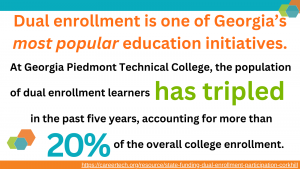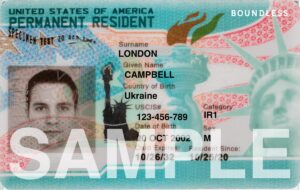
“Workforce development?” – Why are we paying for college classes for illegal aliens who are not eligible for employment?
We hope regular readers of this space and the audience of Scott Ryfun’s superlative “Straight Talk” radio show know this writer and the Dustin Inman Society have been pushing for significant change to Georgia’s Dual Enrollment program for several years. I am grateful for a weekly segment on Scott’s show – Thursdays at 8:35 AM.
The quick, elevator ride explanation of Dual Enrollment is that our tax dollars are going to fully fund college classes for Georgia high school students – including the cost of books and fees. It’s zero cost for the student. A more in depth explanation here.
Like a great deal of what happens under the Gold Dome in Atlanta, the program is operated and funded in the name of increasing the size of Georgia’s skilled workforce. Along with the Metro Atlanta Chamber of Commerce, the Georgia Chamber of Commerce wants more workers. They usually get what they want.
What Gov. Kemp, Republican leadership in the General Assembly, and the special interests have kept quiet is the fact that illegal alien students are not excluded from the Dual Enrollment program. Further, the hope is that nobody (including our state legislators) will remember that federal law makes “the undocumented” ineligible to work.
A perfectly logical question for our state lawmakers: “Since they cannot legally work anywhere in the USA, why are you voting for legislation that pays for a college education for illegal aliens using my taxes?”

- According to the Georgia House Budget and Research Office, the 2025 state budget for Dual Enrollment is $91.3 million.
It is truly astonishing to this writer that voters remain silent on matters like this.
As a nudge for concerned Georgians to take action, we paste language below that can be introduced as legislation for the 2025 legislative session. The wording that will exclude illegal aliens is in bold italics (a Lawful Permanent Resident is a ‘green card’ holder). After working in the Capitol for nineteen years I can assure readers that the below proposal will need very little adjustment to become effective law if there is an interest in doing so.

I predict that there will be an effort to dilute the language so as to allow the should-be illegal aliens who have been improperly granted “parole” to access the free college classes. But one thing at a time.
About here I should remind voters that if they remain silent on this, the current arrangement will not change. We must make our voices louder than the well-funded lobbyists.
The hope here is that readers will send the below draft of legislation to their state legislators and maybe give them a friendly phone call and/or email. To be clear: If you remain silent nothing will change.
- We include a FAQ and response (#7) from the officials at the Georgia Student Finance Commission (GSFC) who operate and administer the Dual Enrollment program:
Is there a residency requirement to participate in Dual Enrollment?”
Response: “There is no residence or citizenship requirement to participate in the Dual Enrollment program. A student must be enrolled at an eligible participating high school located in Georgia or home study program operated pursuant to Code Section 20-2-690 located in Georgia, and meet the postsecondary admissions requirements and enroll in a participating postsecondary institution.”
______________________
DUAL ENROLLMENT REFORM: OUR HANDY, PROPOSED BILL LANGUAGE:
This Act shall be known and may be cited as the “Georgia Dual Enrollment Reform Act of 2025.”
To amend Code Section 20-2-161.3 of the Official Code of Georgia Annotated, relating to the Dual Enrollment Act, purpose, dual credit courses, eligibility for participation, and eligibility for payment, so as to provide for a U.S. citizenship, legal immigration status and residency requirement for eligible students; to provide for an effective date and for applicability; to provide for related matters; to repeal conflicting laws; and for other purposes.
Section 20-2-161.3 of the Official Code of Georgia Annotated, relating to the Dual Enrollment Act, purpose, dual credit courses, eligibility for participation, and eligibility for payment, is amended by revising paragraph (9) of subsection (b) as follows:
“(9) ‘Eligible high school student’ means a student who is a U.S. citizen or Lawful Permanent Resident who remains a resident of the state while participating in the program, and who is:
(A) Entering or enrolled in eleventh or twelfth grade at an eligible high school taking any eligible dual credit course at any eligible postsecondary institution; or
(B) Entering or enrolled in tenth grade at an eligible high school when such student: (i) Is enrolled in an eligible CTAE course at an institution within the Technical College System of Georgia;
(ii) Has obtained prior to the beginning of the term of dual enrollment coursework an SAT or ACT test score that would meet the assessment requirements of a Zell Miller Scholar pursuant to division (27)(A)(i) of Code Section 20-3-519 and is taking eligible core courses at any eligible postsecondary institution; or
(iii) Was enrolled as a ninth grader in one or more dual credit courses at an eligible postsecondary institution for which payment was made under this part on or before June 30, 2020.”
This Act shall become effective on July 1, 2025, and shall apply to all school years beginning on or after July 1, 2025.
All laws and parts of laws in conflict with this Act are repealed.
Please feel free to send this post to your state Senator and your state House Rep.
_
A version of this column was published in the August 5, 2024 edition of The Islander newspaper in Glynn Co.

